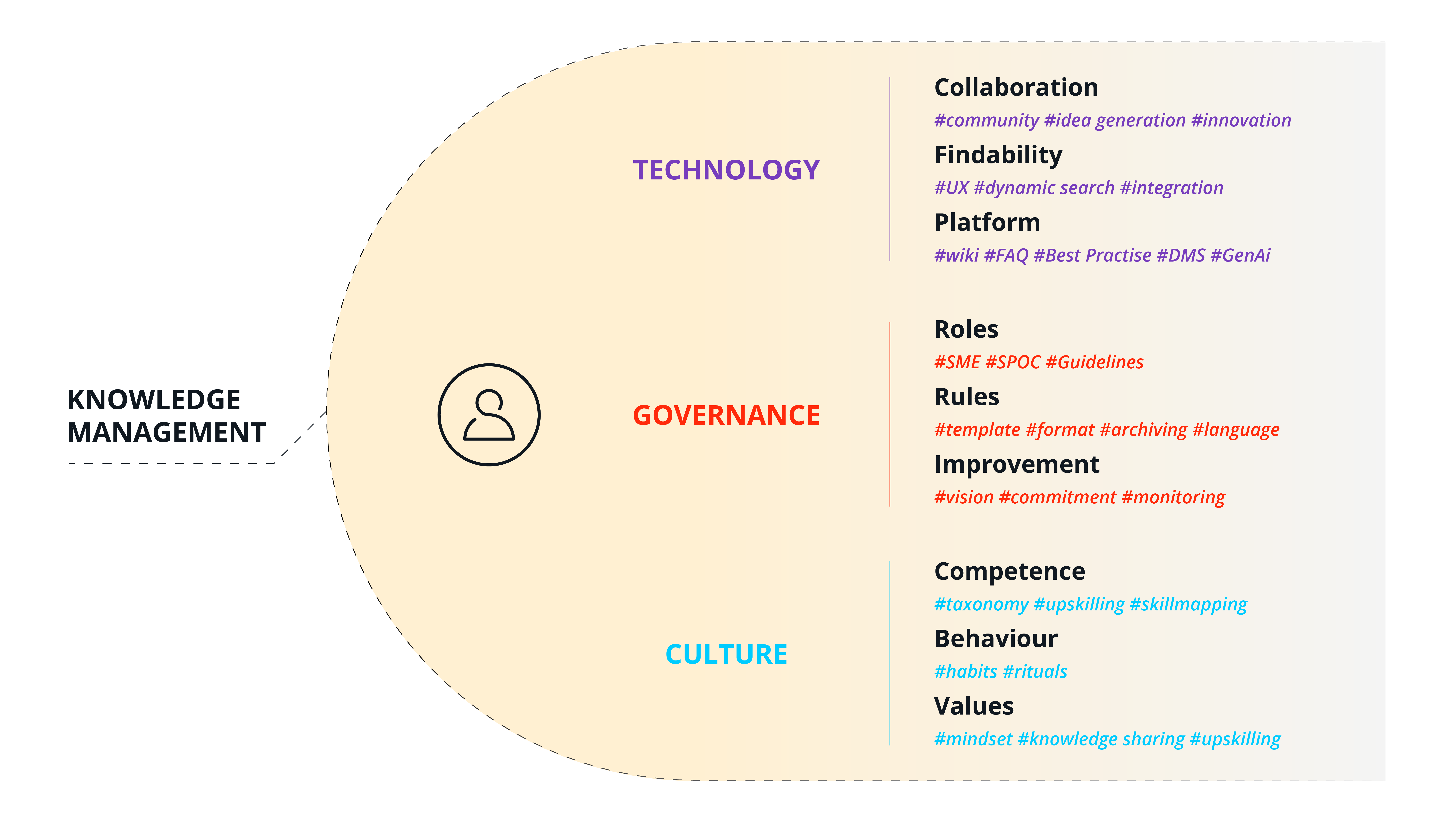Implementing Knowledge Management models in organisational contexts
Managing knowledge as a differential and distinctive asset
In the continuous challenge to improve productivity and efficiency in organizational contexts, with the ambition for innovation and competitiveness, knowledge management is certainly a fundamental variable but often underutilized due to its complexity.
In this context, knowledge refers not only to patents and copyrights but also to the intrinsic knowledge developed by the corporate population: from practical skills to operational and procedural know-how; from managing individual tasks to the operational mechanisms of a business direction.
How often in an organizational context do we reflect on critical points such as the searchability of information and documents, organizational silos, issues related to personnel replacement, simplification and effectiveness of onboarding, and how many actions are implemented to meet these needs?
In a context of increasing digitization (which, if not properly governed, can cause phenomena of digital overload), the most immediate risk is the dispersion and fragmentation of the flows that regulate the sharing and dissemination of know-how, leading to the obsolescence of information, duplication of channels and sources, and the decrease in the “findability” of resources necessary for the employee’s working life.
In this sense, it is necessary for every evolved organizational context to equip itself with a Knowledge Management model, a set of processes that govern knowledge, promoting and regulating its creation, systematization, and dissemination, to ensure the capitalization of one of the key elements of the corporate heritage.
This model requires, on one hand, rigidity in application, for example, to standardize content archiving methods through predefined metadata, and on the other hand, flexibility in adapting to the introduction of new processes and tools, which do not always lead to codified content but to more abstract ideas and concepts.
Regarding knowledge management, it is possible to identify three levels of application to consider: Process, Function, and Company.
Each level involves different objectives and implications of intervention:
Process
Regulating information flows within an operational process is fundamental to completing the individual task and regulating communications between the involved parties. The objective of a Knowledge Management model applied to the individual process is to improve operational efficiency, with the aim of:
Ensuring the uniqueness and accessibility of information
Reducing dependency on alignment meetings
Correctly attributing ownership and accountability
Function (or Direction)
The individual business function must ensure continuity and consistency in activities and the circulation of knowledge, both internally and towards other divisions, with the aim of developing adaptability to the continuous changes it undergoes. The objective of a Knowledge Management model applied to the business function is to consolidate the core competencies perimeter with the aim of:
Facilitating rapid and effective onboarding
Enabling real interchangeability to leverage during peak workloads
Promoting the concept of delegation and developing effective backup mechanisms
Company
Relationships and knowledge are elements that need to be correctly governed to make the company competitive within its industry and able to develop its network of contacts and create innovation. The objective of a Knowledge Management model applied to organizational contexts is to create identifying and differential assets with the aim of:
Consolidating the developed know-how
Developing in-depth sector knowledge by collecting references and best practices
Strengthening the employee experience to reduce turnover risk and increase employee engagement
Given these possible levels of application, enabling factors must be considered for designing a new Knowledge Management model.

Picture 1 – OpenKnowledge
Governance
Corporate knowledge is not a stable phenomenon but is updated daily. For this reason, it is essential to foresee methods and mechanisms for maintaining it over time. Therefore, it is important to ensure the commitment of top management for the correct adoption of the new model and that all those called to contribute to the codification or dissemination of knowledge are provided with roles, policies, and rules to follow to standardize the processes of content creation and fruition. Defining formats, classification and archiving methods, and specific roles is fundamental to providing a common framework within which to operate. Moreover, monitoring and control practices are fundamental to intervene with any fine-tuning and support a long-term strategy and continuous improvement.
Culture
For knowledge to be useful, it must be complete, accurate, and accessible (also in terms of language and comprehensibility); therefore, to overcome complexities and anticipate the organization’s informational needs, it is important that knowledge management processes follow a philosophy of collaboration and sharing in the work environment. At the same time, it is necessary to develop a coherent mindset that materializes in observable and implementable behaviors capable of supporting a culture increasingly oriented towards creating an open and continuous learning and collaboration environment.
Technology
Managing high volumes of documents requires dedicated platforms that allow their searchability and consultation. But coding forms may not be limited to documents managed in a Document Management System. FAQs, wikis, best practices, and thematic websites are more usable content that conveys the necessary information more immediately using Enterprise Content Management Systems.
Even non-codified knowledge needs dedicated spaces to be conveyed through social collaboration practices and thematic communities.
Moreover, emerging technologies enable new forms of content processing and creation, which, however, require greater effort in data management and output control.
The partnership with Syllotips: AI-powered Knowledge Management
Among the innovative technologies, OpenKnowledge has identified Syllotips, with which it has initiated a strategic partnership. Syllotips is a knowledge-sharing platform, supported by artificial intelligence and fully integrable into Microsoft Teams, that optimizes the circulation of skills among company employees, aiming to capture and reuse uncodified knowledge, avoiding the inefficiency of word of mouth. SylloTips has been chosen to participate in the Techstars 2024 acceleration program.
We interviewed the CEO and co-founder of SylloTips, Giorgio Barnabò, to investigate new trends and best practices on the topic.
What is Syllotips and how did it come about?
Syllotips was born from an intuition during university years: often the knowledge acquired by members of a large organization is not shared due to reluctance to accurately codify their knowledge.
Over the years, some fundamental experiences followed: a research project in Paris on tacit knowledge, where we explored the design of a search engine for identifying competent subjects on certain topics, and a Ph.D. on artificial intelligence as a vehicle for capturing undocumented knowledge.
After various attempts and much customer discovery, with my partners Leonardo Martini, Simone Silvestri, and Tullio Persiani, we conceived a company-friendly system that allows business support functions (e.g., IT, HR, Communication, …) to have a knowledge base available, consultable conversationally but adding the “human in the loop“: when the chatbot fails to answer the question, the system directly contacts competent people who, by responding, contribute to codifying tacit knowledge and feeding the knowledge base.
How does AI enable a new way of generating and managing knowledge?
Generative AI enables a new way of managing knowledge because it introduces an innovative paradigm: moving from intelligent document search to conversational answer search. This is a major transformation because it involves a huge advantage in not having to sift through sources and documentation, but it also involves new risks to be aware of: the system’s discretion in selecting the source can lead to partiality of the available answers.
Moreover, artificial intelligence makes multilingual systems available, opening the doors to more equitable knowledge distribution.
The great challenge for Syllotips is to create an AI system that, in the absence of necessary information to respond to the user, is aware and therefore contacts process experts to integrate the missing knowledge.
What are the needs and challenges that emerge in managing new Knowledge Management tools and processes?
The introduction of such innovations requires substantial support for digital adoption and understanding both the potential and the limitations of this tool.
There is a strong demand from users for training and supporting documentation.
Moreover, we are registering the need from users to have a private space where they can collect their information and work on identified knowledge gaps.
What is Syllotips’ competitive advantage?
Working with a startup created by founders with technical expertise means having access to discoveries and innovations from the research world. On technologies like artificial intelligence, which transform rapidly, this allows for strong flexibility and speed in developing new features.
Moreover, integration with Microsoft Teams allows for better user experience and quicker access to the tool.
Finally, the partnership with BIP-OpenKnowledge has allowed us to integrate, beyond the technological element, expertise on change management topics: a successful technological project cannot overlook the cultural and adoption component.
In a period of intense research into the operational application of technologies such as artificial intelligence, Syllotips represents a best practice in the process of innovation, integration, and standardization of Knowledge Management. The projects carried out in partnership with BIP-OpenKnowledge provide insights and reflections for those who see the need to embark on this type of path and make their know-how a competitive asset, synergistically between technological and cultural dimensions.
Authors
Davide Del Basso, Giulio Ottaviano

 20 November 2024
20 November 2024
